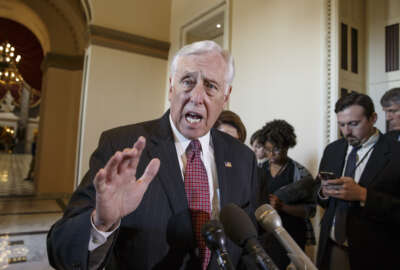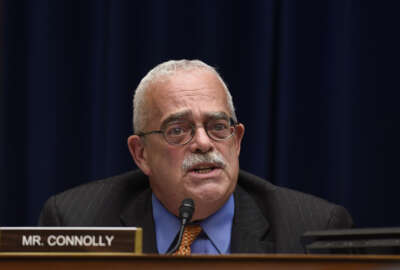
Senators pledge support on ‘5 fights for feds’
Fifteen senators signed a resolution this week, expressing their support of the federal workforce and pledging their opposition to recent actions from Congress and...
Some senators are recognizing the federal workforce and its contributions and have signed a resolution opposing efforts that jeopardize employees and their merit system principles.
The resolution has support from 15 senators — all of them Democrats — who say recent actions from Congress and the White House jeopardize the federal workforce and the ability to meet its mission.
“Effective functioning of the federal government and the integrity of the civil service have been undermined by efforts to decrease pay and benefits and reduce rights with respect to due process and collective bargaining,” the senators wrote.
The resolution itself pledges little: senators are simply promising their intent to block legislation that weakens federal pay, benefits, retirement and due process or collective bargaining rights.
One recent bill that would likely fall under this category — if it passes the House and moves o the Senate — would make significant changes to the way agencies fire and discipline poor performers and employees accused of misconduct.
Rep. Barry Loudermilk (R-Ga.) introduced the Modern Employment Reform, Improvement and Transformation (MERIT) Act last month.
According to the bill, agency heads must give the employee written notice of the firing or disciplinary action no less than seven days or more than 21 days before taking action against the employee.
Employees have an opportunity to respond within the remaining time of their employment. They can still appeal to the Merit Systems Protection Board and have seven days after the firing to submit an appeal.
MSPB must render a decision within 30 days. If the agency can’t issue a decision within that time frame, the disciplinary action is final.
Employees awaiting a decision on their appeals from MSPB can’t receive any pay, bonuses, awards, incentives, student loan repayments or benefits, the bill said.
Loudermilk’s proposal has 12 Republican cosponsors.
The Senate resolution mentions a few recent actions that the senators oppose, including the President’s short-term hiring freeze and the reinstatement of the Holman Rule.
President Donald Trump signed off on a hiring freeze for some federal employees, which he authorized on the first few days of his administration. The freeze will last roughly 90 days, or until the Office of Management and Budget develops a long-term plan to reduce the size of the federal workforce through attrition.
In announcing the freeze, White House Secretary Sean Spicer said the intention was to counter “the dramatic expansion of the federal workforce in recent years,” a point which the senators rebuke in their resolution.
The resolution cites employment data from the Office of Personnel Management: the U.S. population has risen from roughly 198 million to 321 million people in the last 50 years, while the federal workforce dropped from 2.2 million to roughly 2.1 million workers.
“It is in the interest of Congress and the United States for the federal government to be able to attract a diverse, dynamic and dedicated workforce,” the senators wrote.
The resolution also mentions the Holman Rule, the little-known provision that the House last used in the 1980s and recently reinstated it in its rules package for the 115th Congress.
It allows lawmakers to bring an amendment on an appropriations bill to the House floor that may “retrench” agency spending, reduce the number of federal employees in a particular agency or cut the salary or “compensation of any person paid out of the Treasury of the United States.”
There has been no word yet from President Trump about a pay adjustment for federal employees in 2018. Typically, the president includes a directive on a pay adjustment, if any, for federal workers in his annual budget request.
Latest Pay Stories
But Rep. Gerry Connolly (D-Va.), along with Sen. Brian Schatz (D-Hawaii) offered their own proposal last week. The Federal Adjustment of Income Rates (FAIR) Act would give most federal employees a 3.2 percent pay raise next year — a 2 percent pay increase with a 1.2 percent locality pay adjustment next year.
Connolly’s office said the congressman introduced the bill early this year “given the unprecedented attacks on federal workers this Congress.”
Washington metro area Sens. Mark Warner (D-Va.), in addition to Ben Cardin (D-Md.) and Chris Van Hollen (D-Md.), signed the resolution and offered their support.
“We owe it to them to keep our promises,” Warner said in a statement. “I will strongly oppose any efforts in Congress or by the executive branch to diminish the value of their service or deny federal workers access to the fair pay, benefits and protections they have earned.”
Sens. Tom Carper (D-Del.), Richard Blumenthal (D-Conn.), Cory Booker (D-N.J.), Sherrod Brown (D-Ohio), Elizabeth Warren and Ed Markey (D-Mass.), Jeanne Shaheen (D-N.H.), Al Franken (D-Minn.), Patty Murray (D-Wash.), Maria Cantwell (D-Wash.), Richard Durbin (D-Ill.) and Mazie Hirono (D-Hawaii) also added their signatures.
The resolution also has support from the American Federation of Government Employees and the National Treasury Employees Union.
Copyright © 2024 Federal News Network. All rights reserved. This website is not intended for users located within the European Economic Area.
Nicole Ogrysko is a reporter for Federal News Network focusing on the federal workforce and federal pay and benefits.
Follow @nogryskoWFED





